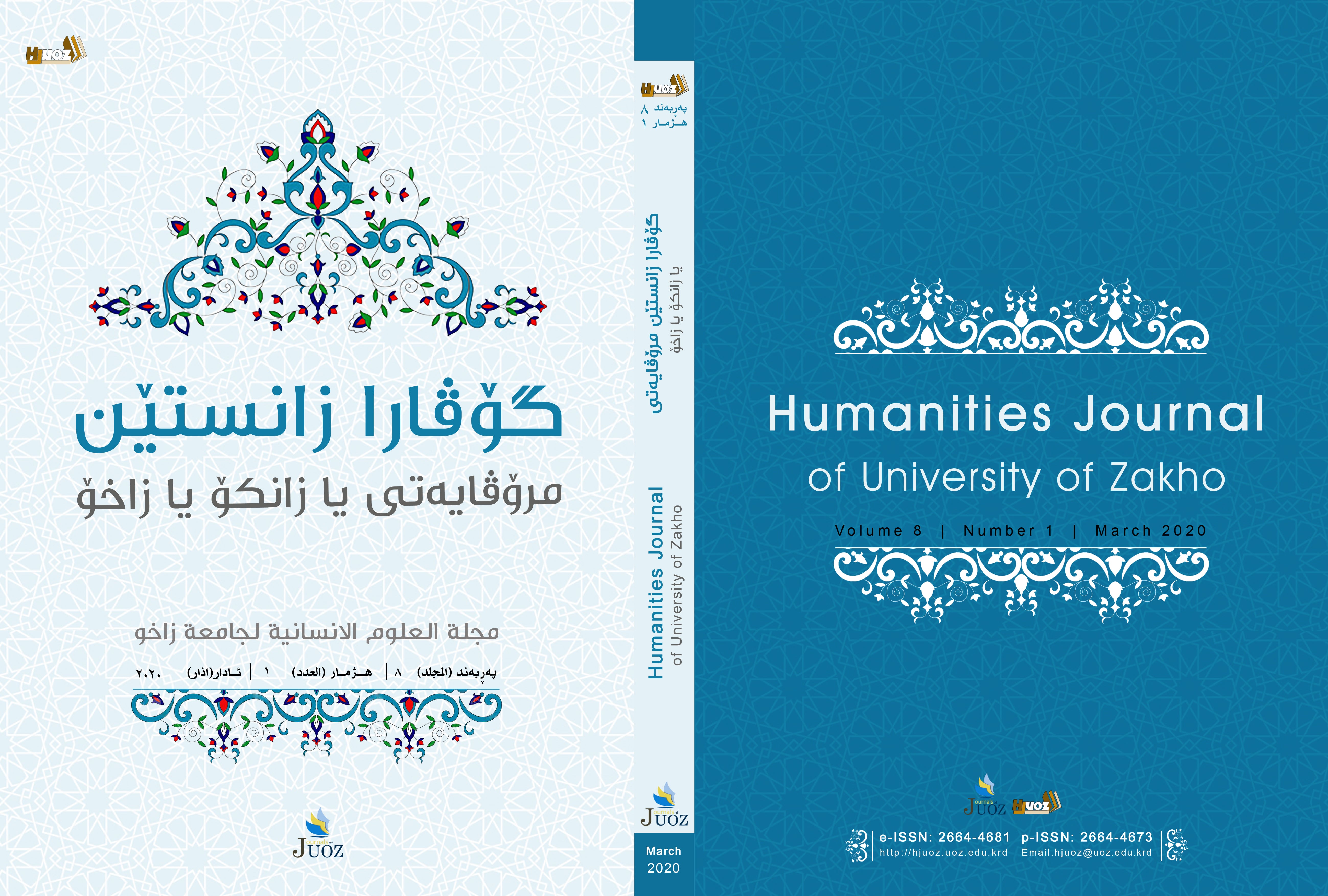Fragmented Society: A Qualitative Study on Social Cohesion in the Kurdistan Region-Iraq
DOI:
https://doi.org/10.26436/hjuoz.2020.8.1.574Keywords:
Fragmented Society, Social Cohesion, Minorities, Exclusion, Kuridstan RegionAbstract
Having accepted the claim that there is something as Kurdistan Region society, I argue that society, even in its homogenic form, is not safe from disagreement and conflict at internal level. With this approach towards the concept of society, this research investigates the principles and issues of social cohesion in the Kurdistan Region. It explores the extent to which the grievances and injustice among all the segments of society, including ethno-religious minorities and at inter-communal (between cities) level, have confronted the Kurdistan Region’s society with further segregation and fragmentation.
Downloads
References
عەبدوڵڵا، بەیار عومەر (٢٠١٦) ناعەدالەتی جوگرافی و چارەسەرکردنی لەسەر ئاستی سیاسی و ئابووری لە هەرێمی کوردستاندا، بێ شوێن: بێ دەزگای بڵاوکەرەوە.
پەرلەمانی کوردستان (٢٠١٥) پرۆژە یاسای مافی پێکهاتەکان لە هەرێمی کوردستان-عێراق، ساڵی (٢٠١٥). بەردەست بوو لە ڕێکەوتی ١٥\١٠\٢٠١٩ لە ماڵپەڕی: http://www.kurdistan-parliament.org/files/articles/210415111027.pdf
بە زمانی ئینگلیزی
Berger-Schmitt, R. (2000) Social Cohesion as an Aspect of the Quality of Soceities: Concepts and Measurement, EuReporting Working Paper, No. 14, Mannheim: Centre for Survey Research and Methodology.
Castells, M. (1997) The Power of Identity, The Information Age: Economy, Society and Culture, Vol. II. Cambridge: Blackwell.
Chan, J. et al (2006) Reconsidering Social Cohesion: Developing a Definition and Analytical Framework for Empirical Research, Social Indicators Research, vol. 75(2), pp. 273-302.
Durkheim, E. (2013) The Division of Labour in Society, Translation by W. D. Halls, 2nd edition. Hampshire: Palgrave Macmillan.
Giddens, A. (1984) The Constitution of Soceity: Outline of the Theory of Stracturation, Cambridge: Polity Press.
Gough, I. and Olofsson, G. (1999) Capitalism and Social Cohesion: Essays on Exclusion and Integration, London: MacMillan Press.
Green, A. et al (2006) Education, Equality and Social Cohesion: A Comparative Analysis, New York: Palgrave MacMillan.
Hudson, et al (2007) Social Cohesion in Diverse Communities, York: Joseph Rowntree Foundation.
Hunt E. F. and Colander, D. C. (2017) Social Science: An Introdcution to the Study of Society, 17th ed, New York: Routledge.
Jenson, J. (1998) Mapping Social Cohesion: The Sate of Canadian Research, Ottawa: Canadian Policy Research Networks.
Jenson, J. (2010). Defining and Measuring Social Cohesion. Commonwealth Secretariat and United Nations Research Institute for Social Development. Available at: http://www.unrisd.org/80256B3C005BCCF9/search/170C271B7168CC30C12577D0004BA206
Kearns, A. and Forrest, R. (2000) Social Cohesion and Multilevel Urben Governance, Urban Studies, vol. 37(5-6), pp 995-1017.
Larsen, C. A. (2013). The Rise and Fall of Social Cohesion: The Construction and De-construction of Social Trust in the US, UK, Sweden and Denmark. Oxford: Oxford University Press.
McDowall, D. (2004) A Modern History of Kurds, London: I.B.Tauris.
Nolan, P. & Lensky, G. (2009) Human Societies: An Instorduction to Macrosociology, 11th Ed, London: Paradigm Publiphers.
Rajulton, F. et al (2007) Measuring Social Cohesion: An Experiment Using the Canadian National Survey of Giving, Volunteering and Participating, Social Indicators Research, vol. 80(3), pp. 461-492.
Schiefer, D. and van der Noll, J. (2017) The Essentials of Social Cohesion: A Literature Review, Social Indicators Research, 132(2), pp. 579-603.
Spoonley, P. et al (2005) Social cohesion: A Policy and Indicator Framework for Assessing Immigrant and Host Outcomes, Social Policy Journal of New Zealand, No. 24.
Taylor and Davis (2018) Social Cohesion, in Edited by Callan, H. The International Encyclopedia of Anthropology, New York: John Wiley & Sons, Ltd.
Downloads
Published
How to Cite
Issue
Section
License
Authors who publish with this journal agree to the following terms:
- Authors retain copyright and grant the journal right of first publication with the work simultaneously licensed under a Creative Commons Attribution License [CC BY-NC-SA 4.0] that allows others to share the work with an acknowledgment of the work's authorship and initial publication in this journal.
- Authors are able to enter into separate, additional contractual arrangements for the non-exclusive distribution of the journal's published version of the work, with an acknowledgment of its initial publication in this journal.
- Authors are permitted and encouraged to post their work online.

















